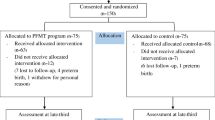Abstract
The objective of this study was to test the short- and long-term effects of pelvic floor muscle training (PFMT) during pregnancy in women at risk, i.e. women who were already affected by urinary incontinence (UI) during pregnancy. The intervention consisted of three sessions of PFMT between week 23 and 30 during pregnancy and one session 6 weeks after delivery, combined with written information. The research design was a randomised, controlled trial with four follow-ups up to 1 year after delivery. Participants in the study were 264 otherwise healthy women with UI during pregnancy, allocated at random to the intervention (112) or usual care (152) group. The main outcome measure was a UI severity scale and a 7-day bladder diary. No effect of pelvic floor muscle training was shown in this study at (half) a year after pregnancy. UI decreased strongly after pregnancy, irrespective of usual care or PMFT during pregnancy. For most women, usual care appears to be sufficient. The results support a ‘wait and see’ policy: wait for the urinary incontinence to take its natural course and see if, for women still incontinent half a year after pregnancy, pelvic floor muscle training is effective.


Similar content being viewed by others
Abbreviations
- PFMT:
-
Pelvic floor muscle training
- UI:
-
Urine incontinence
References
Hunskaar S, Lose G, Sykes D, Voss S (2004) The prevalence of urinary incontinence in women in four European countries. BJU Int 93:324–330
Burgio KL, Zyczynski H, Locher JL, Richter HE, Redden DT, Wright KC, (2003) Urinary incontinence in the 12-month postpartum period. Obstet Gynecol 102:1291–1298
Goldberg RP, Kwon C, Gandhi S, Atkuru LV, Sorensen M, Sand PK (2003) Urinary incontinence among mothers of multiples: the protective effect of cesarean delivery. Am J Obstet Gynecol 188:1447–1453
Holroyd-Leduc JM, Straus SE (2004) Management of urinary incontinence in women. Scientific review. JAMA 291:986–995
Viktrup L, Lose G (2001) The risk of stress incontinence 5 years after first delivery. Am J Obstet Gynecol 185:82–87
Dolan LM, Hosker GL, Mallett VT, Allen RE, Smith ARB (2003) Stress incontinence and pelvic floor neurophysiology 15 years after the first delivery. BJOG 110:1107–1114
Hay-Smith EJ, Bo Berghmans LC, Hendriks HJ, de Bie RA, van Waalwijk van Doorn ES (2001) Pelvic floor muscle training for urinary incontinence in women. Cochrane Database Syst Rev (1):CD001407
Sampselle CM, Miller JM, Mims BL, Delancey JOL, Ashton-Miller JA, Antonakos CL (1998) Effect of pelvic muscle exercise on transient incontinence during pregnancy after birth. Obstet Gynecol 91:406–412
Mørkved S, Kari B, Schei B, Salvesen KA (2003) Pelvic floor muscle training during pregnancy to prevent urinary incontinence: a single-blind randomized controlled trial. Obstet Gynecol 101:313–319
Mørkved S, Bø K (1997) The effect of postpartum pelvic floor muscle exercise in the prevention and treatment of urinary incontinence. Int Urogynecol J Pelvic Floor Dysfunct 8:217–222
Chiarelli P, Cockburn J (2002) Promoting urinary incontinence in women after delivery: randomised controlled trial. BMJ 324:1241–1247
Slieker-Ten Hove MPC, van Hartevelt MHLW (2000) Protocol fysiotherapeutische interventie. Nijmegen
van Hartevelt MHLW (2000) Bekkenproblemen tijdens en na de zwangerschap. Therapieboek voor vrouwen met aan bekkenbodemdysfunctie gerelateerde klachten tijdens en na de zwangerschap. Eindhoven
Vierhout ME (1990) Meting van ongewenst urineverlies bij de vrouw. NTvG 38:1837–1839
Shumaker SA, Wyman JF, Uebersax JS, McClish D, Fantl JA (1994) Health-related quality of life measures for women with urinary incontinence: the urogenital distress inventory and the incontinence impact questionnaire. Qual Life Res 3:291–306
Vaart C van der, Leeuw JRJ de, Roovers JPWR, Heintz APM (2000) De invloed van urine-incontinentie op de kwaliteit van leven bij thuiswonende Nederlandse vrouwen van 45–70 jaar. NTvG 19:894–897
Reilly ETC, Freeman RM, Waterfield MR, Waterfield AE, Steggles P, Pedlar F (2002) Prevention of postpartum incontinence in primigravidae with increased bladder neck mobility: a randomised controlled trial of antenatal pelvic floor exercises. BJOG 109:68–76
Glazener CMA, Herbison GP, Wilson PD et al (2001) Conservative management of persistent postnatal urinary and faecal incontinence: randomised controlled trial. BMJ 323:1–5
Glazener CM, Herbison GP, MacArthur C, Grant A, Wilson PD (2005) Randomised controlled trial of conservative management of postnatal urinary and faecal incontinence: six year follow up. BMJ 330(7487):337, DOI 10.1136/bmj.38320.613461.82
Acknowledgements
We want to thank Miriam Hartevelt, who compiled the PFMT protocol for the four training sessions, and Marijke Slieker, who supervised the PFMT given by the pelvic floor physiotherapists. Most of all, we thank the women who took part in the study. Source of funding: Zon-MW Nr 2200.0052. Ethical approval for the study given by the CWOM (medical-ethical committee of the Radboud University Medical Centre) CWOM-nr.:0002-0038.
Author information
Authors and Affiliations
Corresponding author
Rights and permissions
About this article
Cite this article
Woldringh, C., van den Wijngaart, M., Albers-Heitner, P. et al. Pelvic floor muscle training is not effective in women with UI in pregnancy: a randomised controlled trial. Int Urogynecol J 18, 383–390 (2007). https://doi.org/10.1007/s00192-006-0175-x
Received:
Accepted:
Published:
Issue Date:
DOI: https://doi.org/10.1007/s00192-006-0175-x




